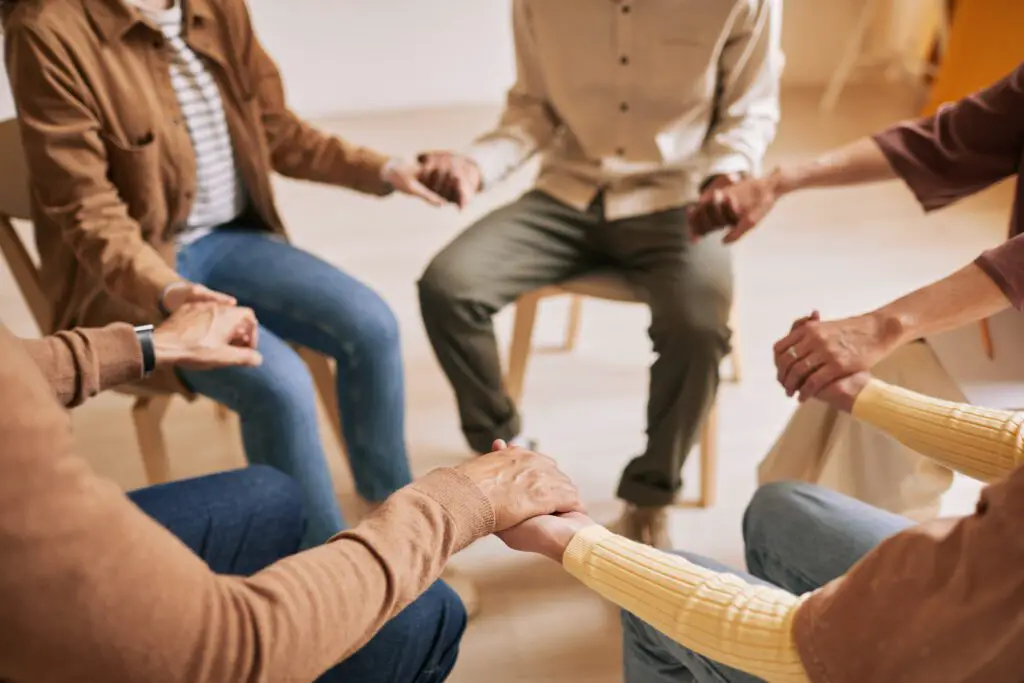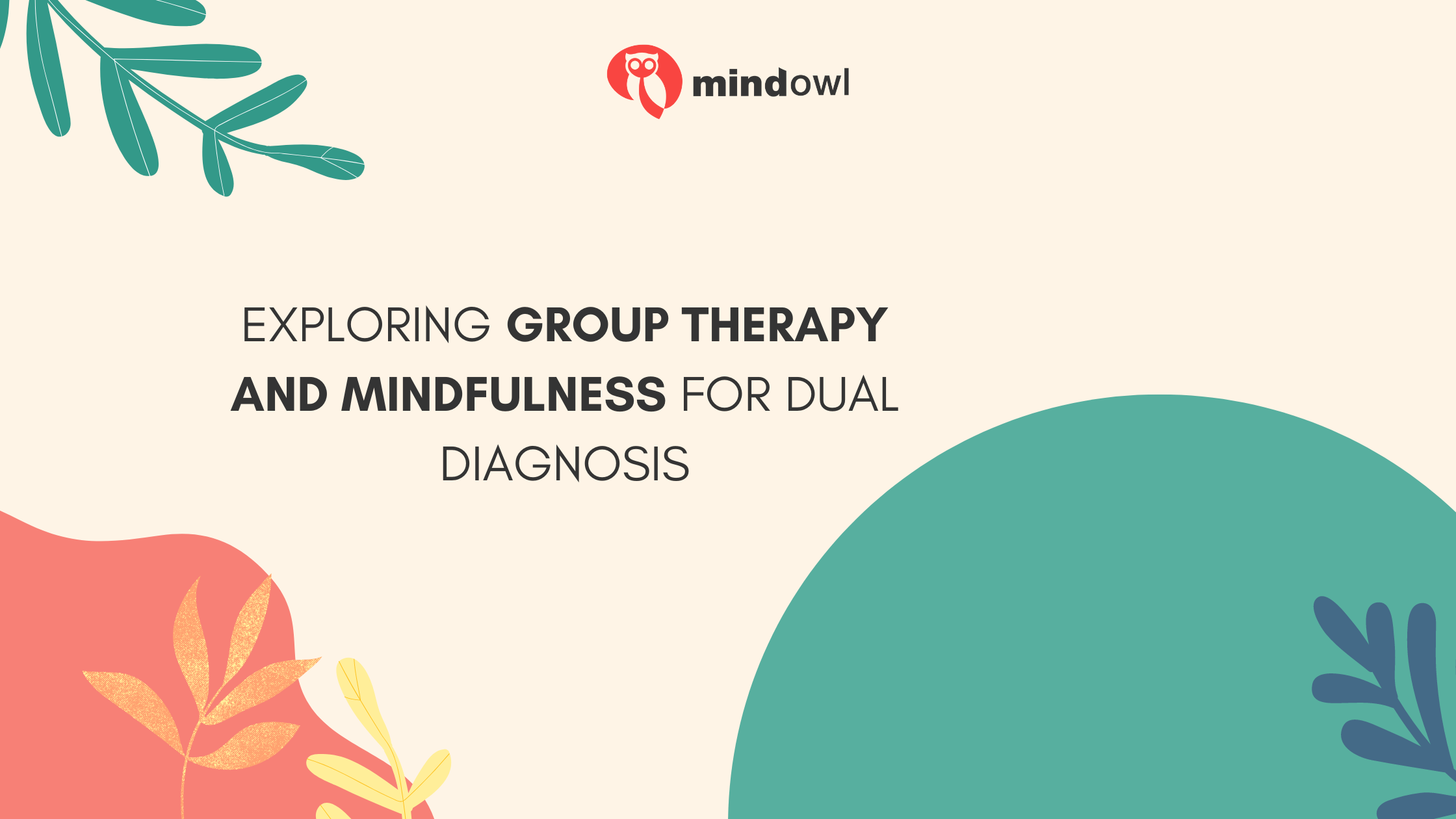This post was developed via a partnership with BetterHelp.
When someone is experiencing substance use disorder (SUD), it’s common to also receive a diagnosis of a mental illness. Conversely, it’s also quite common for someone experiencing mental illness to receive a substance use disorder diagnosis. Receiving a diagnosis of substance use disorder as well as a mental health condition is referred to in psychology as a dual diagnosis.
Receiving any mental illness diagnosis can be challenging, and people facing a dual diagnosis have some unique challenges. There may be more possible factors affecting treatment because the two conditions may overlap, which may make treating each condition more complex. Group therapy is one form of treatment that may be recommended for a person with a dual diagnosis. When looking at treatment options it can be helpful to explore dual diagnosis group topics and learn more about what to expect in a group therapy session.
In this article, we’ll take a closer look at what a dual diagnosis means and how group therapy sessions and mindfulness can be part of an effective treatment plan.
How Common Is Dual Diagnosis?
Receiving a dual diagnosis can understandably seem overwhelming at first. For anyone who has recently been diagnosed with both substance use disorder and a mental illness, there can be quite a wide range of emotions that accompany a dual diagnosis.
Yet it’s quite common for people to be diagnosed with both a substance use disorder and a mental illness. More than half of people who are diagnosed with substance use disorder will also experience a mental health condition.
There can be interrelated issues of how the substance use disorder affects the mental illness, and vice versa. Yet certain mental illnesses seem to most frequently be part of a dual diagnosis. Substance use disorders are often diagnosed along with depressive disorders, generalized anxiety disorder, antisocial personality disorder, trauma, phobias, and anxiety disorders.
Mindfulness And Dual Diagnosis
When a person has a dual diagnosis, it’s especially challenging because two separate medical conditions are being treated. Incorporating mindfulness can help a person to gain more emotional regulation, which can lead to an increased self of self-control and autonomy. It’s beneficial to feel like they have more control over themselves and what happens to them, which can lead to better outcomes.
Mindfulness can also be considered a complementary approach that enhances the effectiveness of a particular form of therapy. According to the National Center for Complementary and Integrative Health, mindfulness-based stress reduction can be effective in conjunction with traditional therapy for a wide variety of conditions. Additional complementary psychological and physical approaches to consider include art therapy, dance, music therapy, yoga, tai chi, acupuncture, spinal manipulation, and massage therapy.
Mindfulness Has Scientifically Backed Benefits
Mindfulness can have a powerful effect on supporting a person’s overall mental wellbeing.
According to the National Institutes of Health, there’s evidence showing mindfulness treatments are effective in reducing anxiety and depression, lowering blood pressure, and improving the quality of sleep. There’s also evidence showing mindfulness may be able to help people better cope with physical pain.
How Group Therapy Works For Substance Use Disorder
Engaging in group therapy is an evidence-backed intervention that is effective in the treatment of addiction to drugs and alcohol. Group therapy is a mental health therapy format that is designed to teach recovery strategies, build a person’s interpersonal skills, strengthen their social networks, and give a person a place to practice life skills that can aid in their overall recovery.
Yet group therapy can feel intimidating to some. It can be challenging enough to discuss sensitive personal experiences with a therapist, but a whole group of people can be a difficult concept for some. And that’s understandable.
Generally, group therapy involves gatherings of six to 12 people who meet regularly. The group is typically led by one or two therapists who guide the group along in sharing, learning interpersonal skills and techniques like mindfulness, as well as understanding more about the physiology of addiction and mental illnesses.

What To Expect In Group Therapy
For many people, attending group therapy for the first time can be intimidating. It’s only natural to be more hesitant around things you’re trying for the first time. When a person knows more about what takes place in a group therapy setting, they may be able to make their first visit more comfortable.
With a dual diagnosis, there can also be interlocking patterns that can emphasize each other. They may even have similar symptoms. Sometimes being in a group environment can help understand you’re not alone.
Feel free to use the following list to become more familiar with the types of activities that are often used in group settings. Knowing what to expect may help alleviate some of the stress that comes with a new experience like attending a group counseling session for the first time.
Group Therapy Topics On Mindfulness
Mindfulness has been shown to change our brains, according to research. Even brief periods of mindfulness can induce more plasticity in the brain’s grey matter. The grey matter in the prefrontal cortex helps a person with their attention, focus, and concentration.
Learning more about mindfulness and how to practice mindfulness in our daily lives is often an important part of group therapy for substance use disorder.
- Discuss how to practice meditation. What are the steps you take? What is helpful about the process of meditating and clearing your mind?
- Discuss some of the benefits of living in the moment regarding recovery. What are things that mindfulness can help us accept – without casting judgment on whether something is good or bad?
- Ask the group about their gratitude practices. How can you make being grateful a regular part of every day of your life? What benefits does gratitude bring to your life?
- As a group exercise, write down five different things in the room that engage all five of your senses. Get into the details and feel the sensations of what it’s like to have five different sensory experiences.
Group Exercises Focusing On Physical Wellness
Many of the ways that we choose to support our physical health and sleep patterns can hold benefits for our mental health and aid in supporting recovery.
- Discuss what nutritional goals you have. Where do you see opportunities to improve your health by making informed nutritional choices? What do you want to stop doing to improve your physical health? Are there any foods that you may have an unhealthy kind of relationship with? Why do you believe this habit to be unhealthy?
- Lead a discussion about the importance of getting restful sleep. What are some of the changes you have made to ensure you’re getting enough deep sleep? What are some of the changes you still want to make to improve your overall sleep quality? Is there anything you wish to stop doing that may be standing in the way of you getting a better night’s sleep?
Personal Inventory Group Exercises
With personal inventory exercise, it’s about looking at specific habits, goals, and patterns surrounding your history with substance use disorder and mental illness.
- Identify your personal triggers and possible patterns surrounding them. Discuss what some of your past triggers have been and what you can do to overcome those triggers in the future.
- Knowing isolation isn’t good for our brains is an important point to be aware of. What amount of time spent alone can be too much? What are some of the ways that being part of this group may help you become more comfortable in connecting with others?
- What is your plan for forgiveness? Who do you have to forgive? How will forgiving yourself and others support your recovery?
Learning Exercises For Group Therapy
Learning about the physiology of addiction and certain mental illnesses can be an important step in recovery. Learning about the effects of drugs and alcohol on the body, as well as things like how anxiety is a natural process in the body, can be a key way to support someone in recovery and help them better manage their mental health illnesses.
- Learning about the effects of alcohol and discussing the ways people in the group have been affected by alcohol use.
- Learning about the neuroscience of drug and alcohol addiction. Many different aspects of how the body reacts to drugs and alcohol can be discussed that may help people to better understand how substance use disorder is a medical disease, not something a person should be blamed for.
- Learn about the psychological concept of locus of control, which has to do with whether something is within our control or outside of our control. How does feeling more in control of your life affect treatment for mental illness and addiction?
- Learning more about human perception and the way the mind works. Optical illusions may be presented to the group to help them understand the way sometimes things are not actually as they appear.
- Discuss the long-term and short-term effects of smoking cigarettes and other forms of tobacco.
In Conclusion
Going through the process of receiving a dual diagnosis can present more challenges than a single diagnosis of a mental health disorder or substance use disorder. So try not to be hard on yourself. Remember that both addiction and mental illness are medical diseases that require treatment.
Don’t hesitate to get help from a mental health professional to get the treatment you need. If you’re living with substance use, contact the SAMHSA National Helpline at (800) 662-4357 to receive support and resources.
MindOwl Founder – My own struggles in life have led me to this path of understanding the human condition. I graduated with a bachelor’s degree in philosophy before completing a master’s degree in psychology at Regent’s University London. I then completed a postgraduate diploma in philosophical counselling before being trained in ACT (Acceptance and commitment therapy).
I’ve spent the last eight years studying the encounter of meditative practices with modern psychology.

